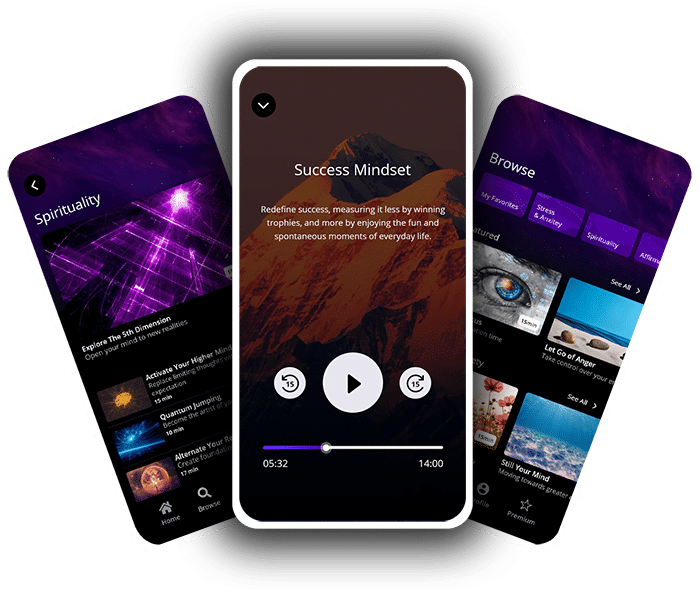The answer to how often to meditate is not entirely straightforward. Different people will have different opinions based on their own personal experiences.
To answer how many times a day to meditate, it depends on what you need. Some people say that you should meditate once every day, while others benefit more by meditating once a week. Some people also get benefits only after meditating twice a day, in the morning and evening.
In this article, you will find the exact frequency of meditation based on your goals and tips to incorporate into your routine.
Here’s a reminder to meditate now!

Unleash Your True Potential!
Explore the world of meditation with our powerful guided sessions crafted to bring peace and strength to your spirit.
But first, let’s ensure our sessions are the perfect fit for you.
Take our short quiz to find out!
Table of contents
How Often To Meditate And For How Long?
If you want to know how often to meditate and how long, the answer depends on many factors. If one of your goals for meditation is to better your mental health, then you should meditate every day. If you are looking to improve your focus, then you should meditate for at least 20 minutes a day. And if you are looking to improve your sleep, then you should meditate for at least 30 minutes a day before bed.
That being said, there is some evidence to suggest that meditating regularly can have a number of benefits. These benefits include emotional intelligence, general self-efficiency, improved mental and physical health, and reduced stress levels.
How to Decide Frequency Of Meditation for Benefits and Better Results?

If you are just starting out, it’s best to start with shorter sessions and gradually build up to the 20-minute. Research shows that even one session of mindfulness meditation can positively affect mood. Being consistent with your practice can help you achieve more benefits over time.
So, if you want to get the best results from each of your meditation sessions, take these factors into account.
Your Reason For Meditation
Your reason for wanting to meditate will highly influence how many times and how much you will meditate. Make a list of what all you want to achieve by meditating. This will also act as a motivating factor for you to meditate every day.
It’s okay to occasionally meditate if you don’t have any specific goals and want to relax for some time. It can be part of your weekly self-care ritual.
When you are meditating to achieve something from meditation, then you must meditate every day. Meditating once or twice a week is not an option if you want to achieve something.
Write down all your goals, spiritual, emotional, and health-related. The goals you feel meditation can be helpful for achieving. Then note down the progress you are making. For example, note how many times you felt anxious during the week compared to the last week. If you feel progressively less anxious, then the amount of meditation is working for you.
If you are not seeing progress, then you can increase the time of your meditation practice. Alternatively, you can also take a look at how to meditate the right way to make sure you are doing it right.
What Your Schedule Looks Like
Check your schedule and how busy you are because that is also an important thing to factor in when deciding how often to meditate.
There is a unique connection between your schedule and the need for meditation.
Meditation For People With Busy Schedules:
If you have a very hectic and busy schedule, you need to spend more time meditating. The need for peace and stress management increases as your days become more hectic.
Even though you need meditation more but when you have a very hectic schedule, it becomes harder to make time for meditation. Here’s an article that can help you find more time to meditate.
You can always have multiple meditation sessions throughout the day, given you have one main meditation session. Having multiple short meditation sessions during the day will help you carry the peace with you as your day progresses.
Meditation For People With Easy-Going Schedules:
If you lead a more slow-paced, relaxed lifestyle, then there is not much need for meditation. You can go by practicing mindfulness at most. You can definitely meditate for spiritual goals and purpose. You have the freedom to choose if you want to meditate for an hour or 20 minutes a day.
Your Need For Meditation
Just like medicine, every person is going to have different needs for their mental and emotional well-being. It also changes as your life progresses and you grow and change. This is something also very important to look into before deciding how often you should meditate.

When You Should Meditate More
- Going through a rough patch in life: Good and bad times are part of life. If the good times don’t last, neither do the bad times, and meditations certainly help a lot to get through those rough patches.
- During the time of growth: When you grow from one state to another stage in life. Or when you are on your path to success. When everything is going right, and everything is happening at speed. You need to meditate to calm yourself, center yourself, and ground yourself. Without meditation, we can get into our heads a lot during times of growth and success.
When You Don’t Need Meditation As Much
- When you are at peace: When you are already at peace, you don’t need meditation, but you want to meditate.
- When you have found your life purpose: When you know what is your life purpose you dedicate your life to it. Your whole life becomes like meditation because you are living every moment with purpose.
- After awakening: When you are spiritually awakened, your need for meditation reduces. But, your desire to meditate increases. Meditating after spiritual awakening makes you feel connected to the spiritual world. Meditation becomes natural to you at this stage.
- When you are in the flow state: The flow state means no resistance. When you are working in the flow state, you are already meditating. In case you have a busy schedule because you are in a flow state. Then it’s ok if you don’t meditate because you don’t need meditation. That state of flow is meditation for you.
Conclusion
The bottom line is that you should meditate as often as you need to, depending on the goals you want to achieve. But, if you are looking for general benefits, then you should meditate for at least 20 minutes every day. You can get the best results from meditation if you have someone to guide you. The Enhanced meditation app has meditation programs designed for every possible need. You can plan suitable meditation sessions with plenty of free guided meditations available on the app.










